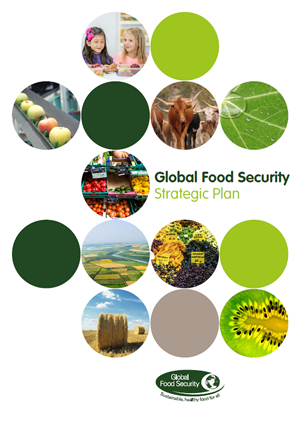Coordination and collaboration are two key strategic roles for the GFS programme, working across the major UK public sector funders of food security research.
Coordination
To improve coordination, three cross-cutting themes have been developed that provide a framework for coordinating, influencing and shaping activities across partners, as well as aligning research agendas to address emerging challenges:
Resilience
Understanding and managing the risks to the food system from environmental, economic and social shocks, the interplay between these, and ways to improve resilience of the food system both now and in the future.
Sustainable production and supply
Including water, energy, nutrients and other inputs; land use and soils, with a particular focus on the sustainable use of resources; improving efficiency and reducing waste; farming systems; food production from crops and livestock; the role of new technologies; food processing, quality, manufacture and distribution.
Nutrition, health and wellbeing
Including food quality and safety throughout the supply chain, nutrition across the life course, healthy and sustainable diets, consumer behaviour, food choice and accessibility.
Collaboration
To improve collaboration, GFS has developed a number of priority areas that would benefit from an interdisciplinary, food systems approach, and that would complement individual partner activities:
Paris-compliant healthy food systems
Helping to tackle climate change whilst improving nutrition by understanding interventions in the food system that would help meet the Paris climate target and deliver against the SDGs. This includes understanding what a future food system might look like, what would be grown and where, the role of technology, and what future diets might look like.
Climatic shocks to the food system
Helping to make the food system more resilient to shocks such as extreme weather and the reaching of tipping points by understanding how we can predict, mitigate and adapt to climatic shocks as well as to gradual climate change. This includes understanding the downstream impacts of sudden yield losses in terms of price shocks and how this is channelled through the food system via policy and markets to consumers.
Behaviour change for adoption of a healthy and sustainable diet
Helping to ensure the food system delivers improved outcomes for health and sustainability by understanding the determinants of dietary choices, the win-wins and trade-offs across health and sustainability, and the mix of interventions required for change across government, business and civil society.
Sustainable management of natural resources in food production
Helping to ensure food production is delivered alongside other ecosystem services within a multifunctional landscape by understanding trade-offs across the nexus of food, water, energy and environment and the role of new technologies, for example, using data from sensors and satellites to enable sustainable food production.
Urban food systems
Helping to ensure positive outcomes for health and sustainability from the rapid trend of urbanisation, in the context of food poverty and the nutrition transition, by understanding food demand and provision in cities, the demands on local resources, and the role of new technologies in urban agriculture.
Gut microbiome and its impact on health
Helping to reduce overweight and obesity by understanding the role of the gut microbiome, the composition of microbes required for good health and mechanisms of action, the food stuffs that promote an appropriate diversity of gut microbes, and the impact of increasing homogenisation of global diets.
Post-EU referendum policy landscape
Informing future UK food and farming policy through horizon scanning, synthesising existing knowledge and developing interdisciplinary research priorities.
For more information on the GFS programme strategy, see our strategic plan:

Global Food Security Strategic Plan
This document describes the GFS programme’s strategy, including its three programme themes and a number of interdisciplinary research priorities that would benefit from a food systems approach.
(You can view PDF documents by downloading a PDF reader. We recommend using Google Chrome or Mozilla Firefox web browsers.)

